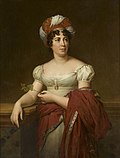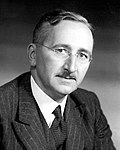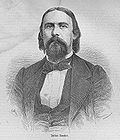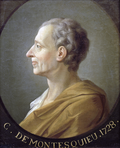
Back بوابة:ليبرالية Arabic Portal:Liberalizm Azerbaijani Πύλη:Φιλελευθερισμός Greek Portail:Libéralisme French Портал:Либерализм Russian ද්වාරය:ලිබරල්වාදය Singhalese Portal:Liberalizm Turkish Portal:自由主义 Chinese
The Liberalism portal
Liberalism is a political and moral philosophy based on the rights of the individual, liberty, consent of the governed, political equality, the right to private property, and equality before the law. Liberals espouse various and often mutually conflicting views depending on their understanding of these principles but generally support private property, market economies, individual rights (including civil rights and human rights), liberal democracy, secularism, rule of law, economic and political freedom, freedom of speech, freedom of the press, freedom of assembly, and freedom of religion. Liberalism is frequently cited as the dominant ideology of modern history.
Liberalism became a distinct movement in the Age of Enlightenment, gaining popularity among Western philosophers and economists. Liberalism sought to replace the norms of hereditary privilege, state religion, absolute monarchy, the divine right of kings and traditional conservatism with representative democracy, rule of law, and equality under the law. Liberals also ended mercantilist policies, royal monopolies, and other trade barriers, instead promoting free trade and marketization. The philosopher John Locke is often credited with founding liberalism as a distinct tradition based on the social contract, arguing that each man has a natural right to life, liberty and property, and governments must not violate these rights. While the British liberal tradition emphasized expanding democracy, French liberalism emphasized rejecting authoritarianism and is linked to nation-building. (Full article...)
Selected article -
Civil liberties are guarantees and freedoms that governments commit not to abridge, either by constitution, legislation, or judicial interpretation, without due process. Though the scope of the term differs between countries, civil liberties often include the freedom of conscience, freedom of press, freedom of religion, freedom of expression, freedom of assembly, the right to security and liberty, freedom of speech, the right to privacy, the right to equal treatment under the law and due process, the right to a fair trial, and the right to life. Other civil liberties include the right to own property, the right to defend oneself, and the right to bodily integrity. Within the distinctions between civil liberties and other types of liberty, distinctions exist between positive liberty/positive rights and negative liberty/negative rights.
Libertarians advocate for the negative liberty aspect of civil liberties, emphasizing minimal government intervention in both personal and economic affairs. Influential advocates of this interpretation include John Stuart Mill, whose work On Liberty argues for the protection of individual freedoms from government encroachment, and Friedrich Hayek, whose The Road to Serfdom warns against the dangers of expanding state power. Ayn Rand's Atlas Shrugged and Ron Paul's The Revolution: A Manifesto further emphasize the importance of safeguarding personal autonomy and limiting government authority. These contributions have played a significant role in shaping the discourse on civil liberties and the appropriate scope of government. (Full article...)
Selected biography -

Thomas Hill Green (7 April 1836 – 26 March 1882), known as T. H. Green, was an English philosopher, political radical and temperance reformer, and a member of the British idealism movement. Like all the British idealists, Green was influenced by the metaphysical historicism of G. W. F. Hegel. He was one of the thinkers behind the philosophy of social liberalism. (Full article...)
List of selected biographies
|
|---|
Selected quote
General images
Subcategories
Related portals
WikiProjects
Topics
Recognized content
Associated Wikimedia
The following Wikimedia Foundation sister projects provide more on this subject:
-
Commons
Free media repository -
Wikibooks
Free textbooks and manuals -
Wikidata
Free knowledge base -
Wikinews
Free-content news -
Wikiquote
Collection of quotations -
Wikisource
Free-content library -
Wikiversity
Free learning tools -
Wiktionary
Dictionary and thesaurus
© MMXXIII Rich X Search. We shall prevail. All rights reserved. Rich X Search


























































